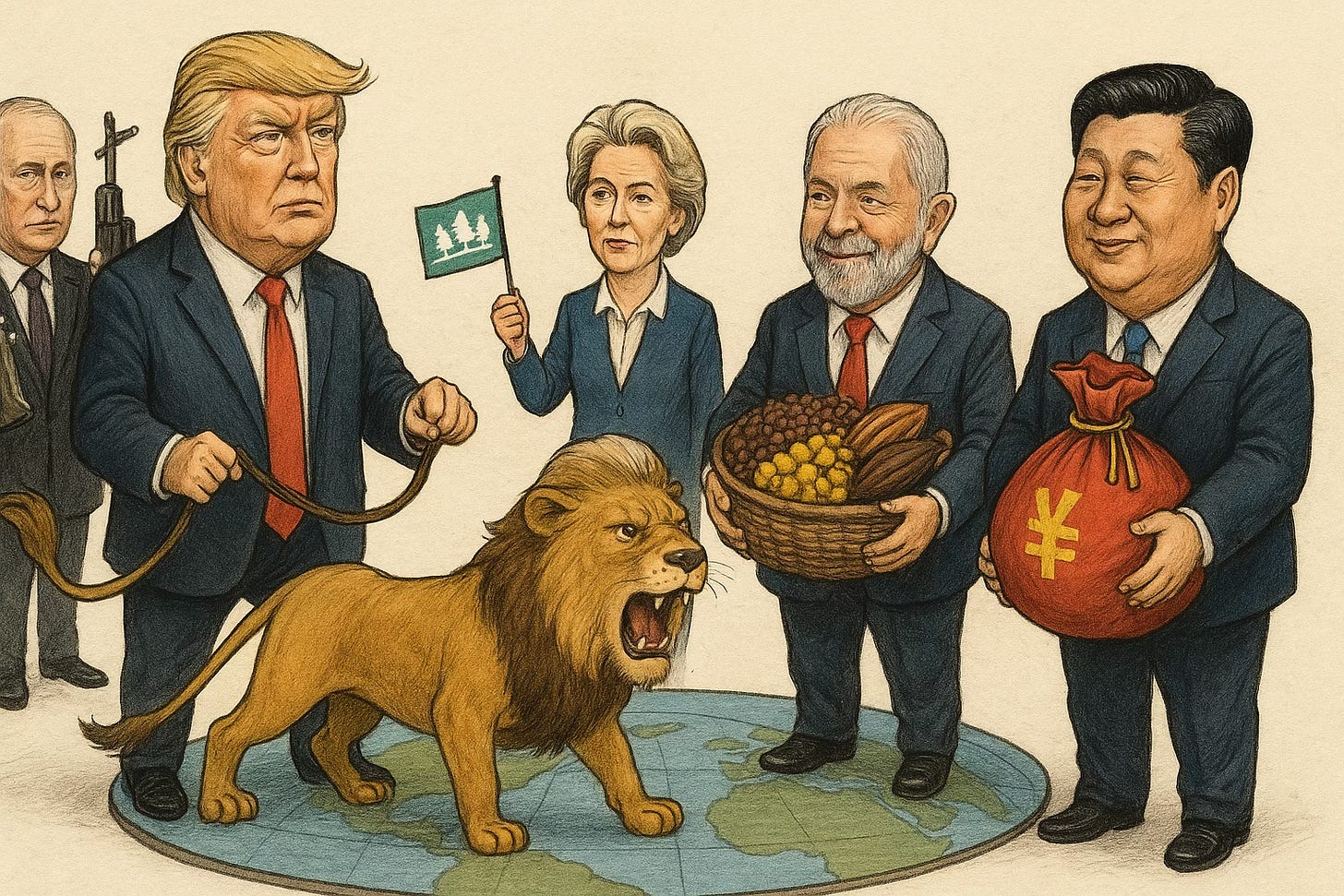EUDR Delay Explained: Risks, Opportunities, and the Future of Supply Chain Resilience
What the EU’s deforestation law postponement means for sourcing strategies, compliance costs, and market competitiveness in a multipolar world.
A Story from Brazil
In Brazil, political and regulatory instability has long been the norm. Every new administration reshuffled institutions, rewrote rules, and undermined credibility. Yet, despite this turbulence, the country advanced, not because Brasília (national capital) offered stability, but because society and business learned to move forward without relying on the state. Farmers organized cooperatives to access markets. Companies built roads and entire cities when government failed. NGOs filled gaps in enforcement with policy schemes. Progress came from initiative, not from waiting.
This Brazilian experience is why the EU’s decision to delay the EUDR (EU Deforestation Regulation) by another year feels familiar. It is not simply about technical readiness or IT systems. It signals that Brussels may not be the reliable compass many expected. And, as in Brazil, the lesson applies: those who wait lose, those who act advance.
The Event and the Signal Behind It
The EU officially announced a 12‑month delay in enforcing the EUDR, citing incomplete IT infrastructure and the risk of trade disruption. On the surface, a technical adjustment. But the real message runs deeper. Europe still seeks to project leadership in the global environmental agenda, even as the larger game is the reorganization of world politics. Timing is awkward: while the EU positions itself as climate regulator of the world, it struggles to maintain relevance in security, trade, and diplomacy. The delay exposes not only a lack of readiness, but also a mismatch between ambition and capacity.
The External Perspective
From the outside, the EU appears weakened. Russia’s war revealed its dependence on fragile energy flows and deep struggle to mediate tension. Tariff disputes with the US damaged industrial competitiveness. The conflict in Palestine highlighted hesitation, with the EU acting as a spectator rather than a shaper of events. In this context, unilateral climate leadership looks disconnected. Rather than reinforcing influence, it risks reinforcing Europe’s isolation. Other blocs may perceive the EUDR as a protectionist barrier rather than a standard to emulate. The geopolitical cost of the delay is not just a lost year for forests but another signal of Europe’s fragile position in a multipolar order.
The Internal Perspective
Within Europe, the consequences are equally critical. Investments already made in traceability systems, satellite monitoring, and certification remain in limbo. Early movers that acted fast cannot capture short‑term returns. Laggards feel justified in postponing further, lowering overall momentum. Institutional trust erodes, as Brussels confirms its reputation for setting rules it cannot implement. Most importantly, supply resilience weakens: without predictable rules, buyers and suppliers cannot plan volumes, contracts, or long‑term investments. Security of supply requires certainty; the delay creates the opposite.
The Business Perspective: Companies in Europe
For companies headquartered and operating in Europe, the lesson is clear: uncertainty is not temporary, it is structural. Geopolitical instability, regulatory hesitation, and fragmented alliances will remain the baseline. Companies that already invested in transparency and traceability are not losing money; they are gaining resilience. They lock in more stable contracts, reduce exposure to price volatility, and build trust with suppliers, investors and consumers. Those that did not invest remain exposed to shocks.
Similarly to the Brazilian experience, companies in Europe must act, not wait for further political and external developments, the implications (and benefits) are real and practical to the business. Some actions available now:
Strengthen traceability as a resilience tool, not a compliance checkbox.
Form local partnerships with cooperatives, producer associations, extension services and NGOs to ensure adoption at farm level.
Strengthen (not withdraw) sectoral alliances to share costs, create common standards, and amplify influence in Brussels.
Communicate resilience, not compliance: frame transparency as ensuring reliable supply today, not as preparation for a regulation tomorrow.
The Latin American Perspective: A Hidden Opportunity
For Latin American producers and exporters, the delay is not only uncertainty; it is also opportunity. Those who have already invested in origin proof and transparency can differentiate themselves from pure commodity suppliers. A Brazilian coffee cooperative that traces every bag to a farm is no longer just a commodity exporter but a premium partner. A Peruvian cacao exporter with geolocation data is not interchangeable with mass cocoa but a source of verified, deforestation‑free supply. An Argentinean beef producer with digital traceability is not just selling meat but resilience to European buyers seeking certainty. For these players, proof of origin provides preferential access to Europe regardless of the regulatory timeline.
The Bigger Lesson
The delay of the EUDR does not alter direction. Supply chains will still move toward cleaner, more transparent models. What changes is the pace and the perception of Europe’s capacity to lead. If the EU relies only on unilateral regulation to exert influence, it risks isolation in a multipolar world. For businesses and producers, the formula remains: more transparency equals more predictability; more traceability equals more trust; proactive action equals more resilience. Supply resilience stands above regulation.
Takeaway and Call to Action
The EUDR delay is not relief but uncertainty. For Europe, it exposes the gap between ambition and influence. For companies, it tests whether they will wait for clarity or act to secure supply now. For Latin America, it offers a chance to turn origin into value and escape the commodity trap. The market will reward those who turn risk into advantage. The question remains: Are you preparing your supply chain to comply with Brussels, or to thrive in a multipolar food system where resilience is the only real advantage?
P.S. Since companies must take actions and have a clear direction, I developed a specific program that helps leaders in agri-food industry to turn risks into market advantage.



